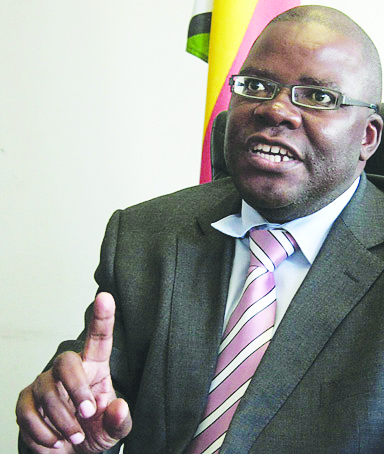


 POWER struggles within the Movement for Democratic Change (MDC-T) have taken an ugly turn with some senior members now being touted to succeed party leader, Morgan Tsvangirai, ahead of or at the party congress scheduled for 2016, The Financial Gazette can exclusively reveal.
POWER struggles within the Movement for Democratic Change (MDC-T) have taken an ugly turn with some senior members now being touted to succeed party leader, Morgan Tsvangirai, ahead of or at the party congress scheduled for 2016, The Financial Gazette can exclusively reveal.
Signs that Tsvangirai has been losing grip of the MDC-T, which he, along with a few others, founded in 1999 started showing before the decisive July 31 polls when a number of party members defied his directive not to participate in the disputed elections.
The trend continued after the elections with self-exiled MDC-T treasurer-general Roy Bennett calling for leadership renewal, the first time the subject has been raised in the public domain.
This week, the discord intensified as evidenced by the party’s councillors who put themselves on a collision course with Tsvangirai by defying his orders.
MDC-T councillors in Victoria Falls, Redcliff and Kwe-kwe scoffed at Tsva-ngirai’s directives by voting for mayoral candidates of their choice, aligning with ZANU-PF in some instances, while disregarding those preferred by their leader.
Calls for leadership renewal are now gaining further traction with several names being thrown into the hat as potential successors of the former trade unionist, who appears determined to dig his heels in.
Names being bandied around include that of MDC-T secretary general, Tendai Biti, former Harare mayor, Elias Mudzuri and Tsvangirai’s former lawyer, Brian Kagoro.
Thokozani Khupe, Tsvangirai’s deputy, is also fighting for political survival, with those baying for her blood saying she was no different from the MDC-T leader.
There is, however, fierce resistance from members of Tsvangirai’s kitchen cabinet and others who were with him during his days at the Zimbabwe Congress of Trade Unions (ZCTU), where the MDC-T leader cut his political teeth.
Among those fighting viciously in Tsvangirai’s corner is Lucia Matibenga, the MDC-T’s former Women’s Assembly chairperson who became the minister of labour upon the death of Eliphas Mukonoweshuro in 2011 before she exited government at the expiry of the unity government in July.
Sources revealed this week that Matibenga dressed down Biti at the party headquarters last week and swore that the former finance minister would never lead the MDC-T. She also claimed that she would be the party’s next national chairperson, implying she would take-over from Lovemore Moyo.
It was not possible to ascertain what gave rise to the altercation by the time of going to print. Matibenga declined to comment saying she was ill, while Biti was not reachable.
In previous statements in the run up to the polls and afterwards, Biti has been full of praises for Tsvangirai’s performance and blaming rigging for the party’s poor showing in the last election.
MDC-T insiders said there is deep mistrust between MDC-T members who are former student leaders and those that came from the trade union movement to form the party in 1999, causing fissures within the party.
Tsvangirai has been the MDC-T leader since the party’s formation 14 years ago after using his position as the secretary general of the ZCTU as a springboard to go into politics.
The ZCTU’s president at the time, the late Gibson Sibanda, also became the party’s first vice president, until the MDC-T split in October 2005 over whether the party should have participated in the Senate.
Tsvangirai’s continued leadership of the MDC-T has come under strain after failing to land the country’s presidency in three presidential polls. The MDC-T leader blames it on rigging.
Matters came to a head following his crushing defeat in July 31 polls to end the party’s four-and-a-half years involved in the inclusive government.
Tapiwa Mashakada, the MDC-T deputy secretary general, is of the view that considerations for any leadership renewal should come through the party’s structures and organs.
“That issue has not been raised formally in our meetings and structures. We have the national executive, we have the national council, that issue has not been raised so we cannot go on to chase the wind,” said Mashakada.
“That this one wants to take over, we can’t chase corridor talk. Today it’s A, tomorrow it’s B, the next day it’s C, where do you end if you chase corridor talk?”
On calls by Bennett for leadership renewal, Mashakada said it was something that has been tabled before the party formally.
Obert Gutu, the MDC-T Harare province spokesperson declined to comment but on Monday he posted on Facebook that there were members who were plotting against Tsvangirai.
“Morgan Richard Tsvangirai is the lawfull and legitimate leader of the democratic movement; overwhelmingly and popularly elected by congress in Bulawayo in 2011. He has the mandate of the party to lead us and yes, he should continue to lead us. Now these shrill sounds from some sickly fake democrats calling for his unconstitutional removal from office simply won’t cut. These fake democrats are wolves in sheep’s skin,” wrote Gutu.
“Publicly, they lampoon and lambast how July 31 was stolen but we know that deep down their hearts, they never wanted Morgan to get to State House. They hold meetings, Nicodemously, at some dingy lodge in the avenues and some other such places where they scheme and plot. They cannot be trusted. They never mean what they say nor say what they mean. They speak in forked tongues. They are rabidly power-hungry. Enough is enough. The gloves are off. We will match them pound for pound. They might think they are intelligent but of course, some of us are smarter and more intelligent than them. We will expose them for what they really are.”
On Saturday, Tsvangirai addressed supporters at Sakubva Stadium to commemorate the party’s 14th anniversary where some supporters wondered whether the MDC-T would end up like several other opposition parties such as ZANU (Ndonga), the Zimbabwe Unity Movement, the United African National Congress, the Democratic Party and the United Party that went into a political warfare with President Mugabe and came out heavily bruised.
In his address, Tsvangirai highlighted five areas in which ZANU-PF allegedly subverted the will of the people. He alleged that ZANU-PF paid a shadowy company, Nikuv, millions of dollars to rig the election, which was heavily militarised as 35 000 youths were trained and deployed specifically in Harare, Manicaland and all Matabeleland provinces to intimidate voters.
Tsvangirai also claimed that they have detailed evidence that there was high displacement of voters, mass printing of unaccounted ballots, fake voter’s slips and abuse of traditional leaders to harvest fear at the electorate during the July 31 polls.
Tsvangirai further said the party was proposing to engage the Southern African Development Community and avail a detailed dossier of all the alleged shenanigans used by ZANU-PF to subvert the will of the people. — Additional reporting our correspondents from Gweru and Mutare.